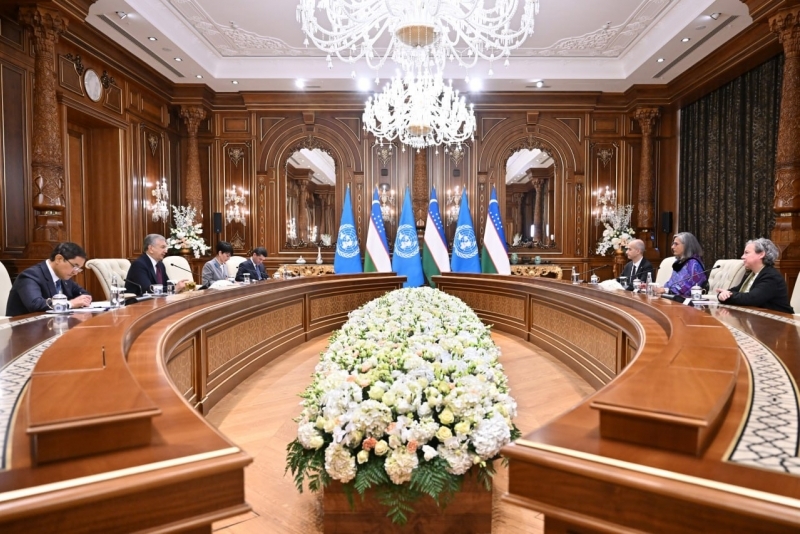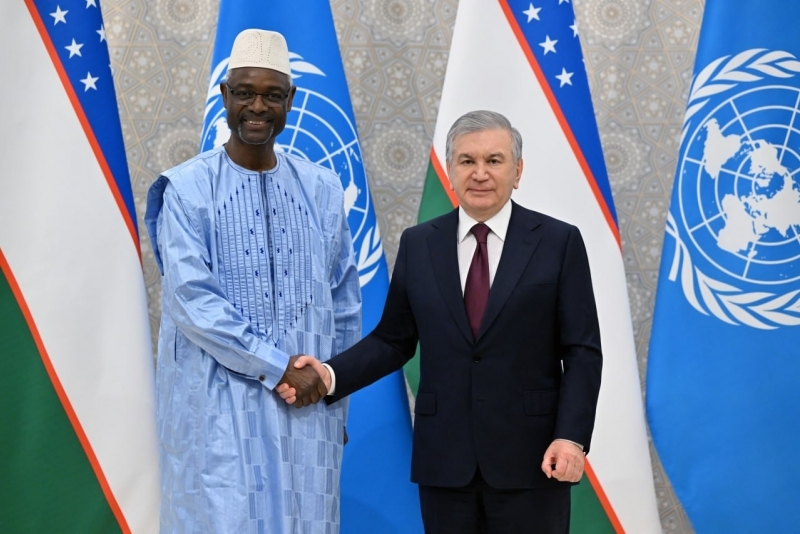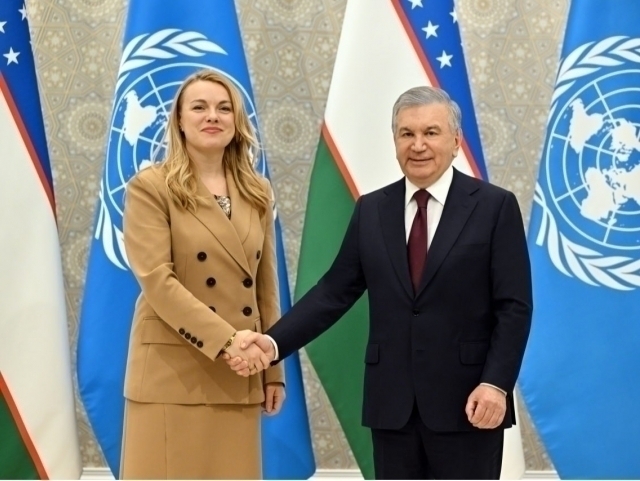Mirziyoyev meets UN officials to discuss climate and development initiatives
Local
−
04 April 2025 3827 4 minutes
On April 4, Uzbekistan’s President Shavkat Mirziyoyev held separate meetings with UN Deputy Secretaries-General during the Samarkand Climate Forum. This was reported by the Presidential Press Service.
During the meeting with UN Deputy Secretary-General and Executive Secretary of the UN Economic Commission for Europe (UNECE) Tatiana Molcean, the high-ranking guest conveyed UN Secretary-General António Guterres’s greetings and warm wishes to the President of Uzbekistan.
President Mirziyoyev emphasized UNECE’s critical role in achieving Sustainable Development Goals by 2030 and highlighted expert assistance provided to Uzbekistan in sectors such as transport, innovations, textiles, energy, ecology, gender equality, and WTO accession matters.
Discussions included implementing regional and national projects, as well as advancing initiatives proposed by President Mirziyoyev during the first summit of the UN Special Programme for the Economies of Central Asia (SPECA) held in Baku in November 2023.
The adoption of SPECA’s development concept until 2030, the signing of a “roadmap” with UNECE for simplifying trade procedures, and the implementation of comprehensive digitization measures within the framework of the Trans-Caspian route were highlighted with satisfaction.

Uzbekistan recently joined the Aarhus Convention on access to information about the ecological condition of populations. Preparations are underway to join the Air Convention and the Convention on the Transboundary Effects of Industrial Accidents. The importance of promptly launching SPECA's Target Fund was underscored.
In a meeting with UN Deputy Secretary-General and Executive Director of the UN-Habitat program, Ana Claudia Rossbach, discussions focused on enhancing multifaceted partnerships for sustainable urban development, infrastructure modernization, and improving living standards.
Rossbach positively assessed Uzbekistan's reforms in urbanization aimed at developing "smart" and "green" cities and creating a comfortable environment for citizens. Expanding cooperation on introducing modern digital solutions in city management, developing "green" construction standards, and launching special programs for climate adaptation in urban environments were deemed crucial.
Plans to celebrate World Cleanup Day in Uzbekistan and establish UN-Habitat’s office in Tashkent were discussed. Both sides agreed on adopting a “roadmap” for practical cooperation.

During the meeting with UN Deputy Secretary-General and Executive Secretary of the UN Convention to Combat Desertification (UNCCD) Ibrahim Thiaw, issues related to combating desertification and land degradation in Uzbekistan and the region were discussed.
Thiaw praised President Mirziyoyev’s speech at the forum, highlighting the relevance of initiatives to tackle climate threats and the timely presentation of Central Asia's "green" development concept.
It was noted with satisfaction that in August last year, the UN General Assembly unanimously adopted Uzbekistan’s resolution on forest restoration, and national goals to prevent land degradation have been initiated.
Plans to involve UNCCD experts in establishing an international scientific network at Tashkent’s “Green” University to address land degradation and combat desertification were agreed upon.
On April 4, the Samarkand International Climate Forum was held. Participants included António Costa (President of the European Council), Ursula von der Leyen (President of the European Commission), Kassym-Jomart Tokayev (President of Kazakhstan), Sadyr Japarov (President of Kyrgyzstan), Emomali Rahmon (President of Tajikistan), Serdar Berdimuhamedov (President of Turkmenistan), Odile Renaud-Basso (President of the European Bank for Reconstruction and Development), Tatiana Molcean (UNECE Executive Secretary), Ana Claudia Rossbach (UN-Habitat Executive Director), Ibrahim Thiaw (UNCCD Executive Secretary), and others.
UN Secretary-General António Guterres delivered a video message to forum participants. The event brought together over 2,000 foreign guests, including leaders of national and global environmental organizations, international structures, experts, scientists, journalists, and business representatives.
Discussions centered around pressing climate issues facing Central Asia, promoting ecological stability, fostering "green" economic development, and enhancing regional cooperation to combat climate change.





